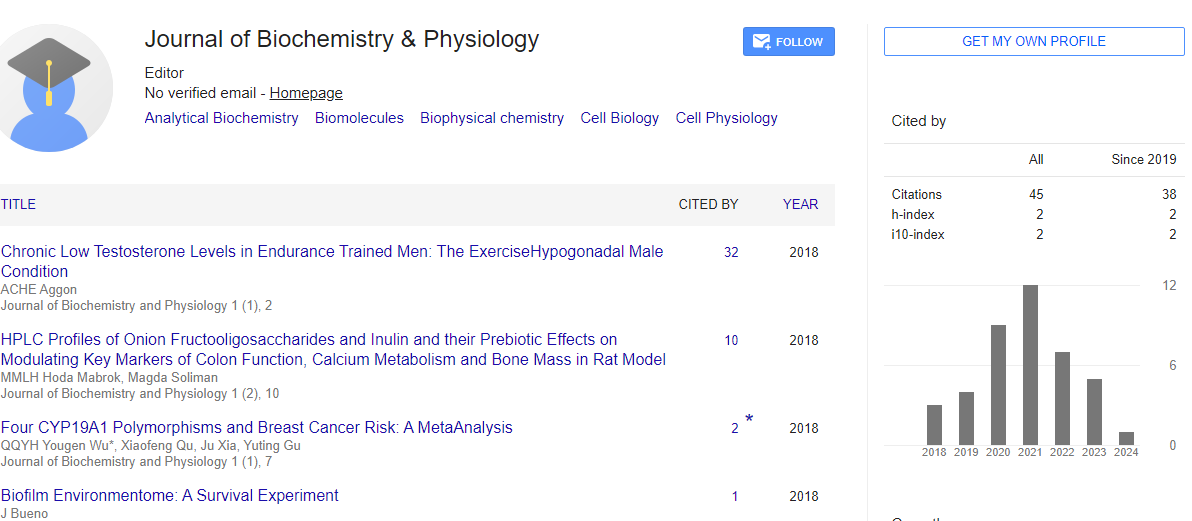Perspective, J Biochem Physiol Vol: 6 Issue: 1
Clinical Diagnosis and Treatment of Renal Tubular Acidosis
Ferd Royan*
Department of Clinical Pathology, University Airlangga, Surabaya, Indonesia
*Corresponding Author: Ferd Royan
Department of Clinical Pathology
University Airlangga, Surabaya, Indonesia
E-mail: ferdroyan@gmail.com
Received date: 20-Feb-2023, Manuscript No. JBPY-23-95819;
Editor assigned date: 22-Feb-2023, PreQC No. JBPY-23-95819 (PQ);
Reviewed date: 09-Mar-2023, QC No JBPY-23-95819;
Revised date: 16-Mar-2023, Manuscript No. JBPY-23-95819 (R);
Published date: 23-Mar-2023, DOI: 10.4172/jbpy.1000127
Citation: Royan F (2023) Clinical Diagnosis and Treatment of Renal Tubular Acidosis. J Biochem Physiol 6:1.
Description
Renal Tubular Acidosis (RTA) is a condition that affects the ability of the kidneys to regulate acid-base balance in the body. This can lead to a buildup of acid in the blood, which can cause a range of symptoms and complications. Understanding the causes, symptoms, diagnosis, and treatment options for RTA is important for individuals and families affected by the condition.
Causes
The most prevalent type of renal tubular acidosis is distal renal tubular acidosis. It can be inherited (inherited in families) or triggered by high blood calcium levels, sickle cell disease, autoimmune disorders such as lupus and Sjogren syndrome, or the use of certain medications.
Proximal renal tubular acidosis: This is most common in newborns and is triggered by a condition known as Fanconi's syndrome. Other reasons include vitamin D deficiency, fructose intolerance, certain medications, and genetic metabolic disorders.
Symptoms
The symptoms of RTA can vary depending on the type and severity of the condition. Common symptoms may include fatigue, muscle weakness, bone pain, frequent urination, dehydration, and growth failure in children. In severe cases, RTA can lead to metabolic acidosis, which can cause confusion, seizures, and even coma. RTA is characterised by excessive potassium and low bicarbonate levels in the blood abdominal discomfort and persistent fatigue, muscle weakness, weight loss despite not feeling hungry. Urinary water loss associated with electrolyte excretion can cause signs of extracellular fluid volume reduction.
Diagnosis
Diagnosing RTA involves a thorough medical history, physical examination, and various tests. These tests may include blood tests to check acid-base balance and kidney function, urine tests to check for abnormalities in urine pH and electrolyte levels, and imaging tests to assess the kidneys and urinary tract.
Treatment
Treatment options for RTA depend on the type and severity of the condition. In some cases, no treatment may be necessary, but regular monitoring and follow-up exams are recommended. In more severe cases, treatment options may include medications to manage symptoms and correct acid-base balance, or in rare cases, kidney transplant. High doses of bicarbonate (greater than 10 mmol/kg per day) are needed. Raising the serum bicarbonate concentration raises the filtered bicarbonate load above the proximal tubule's decreased absorptive capacity, resulting in significant bicarbonate diuresis, requiring a greater quantity of alkali to compensate for these urine losses. Because increased sodium and water delivery to the distal tubule stimulates potassium secretion, higher bicarbonate concentration in urine caused by alkali therapy also raises urinary potassium losses.
Prevention
There is no known way to prevent RTA, but certain measures may help to reduce the risk of developing the condition. These measures may include maintaining good overall health, avoiding exposure to toxic chemicals, and managing underlying conditions that may increase the risk of developing RTA renal tubular acidosis is a complex condition that can cause a range of symptoms and complications. Understanding the causes, symptoms, diagnosis, and treatment options for RTA is important for individuals and families affected by the condition. Individuals with RTA can manage their symptoms and avoid severe complications by working closely with healthcare providers, allowing them to live full and healthy lives.
 Spanish
Spanish  Chinese
Chinese  Russian
Russian  German
German  French
French  Japanese
Japanese  Portuguese
Portuguese  Hindi
Hindi 